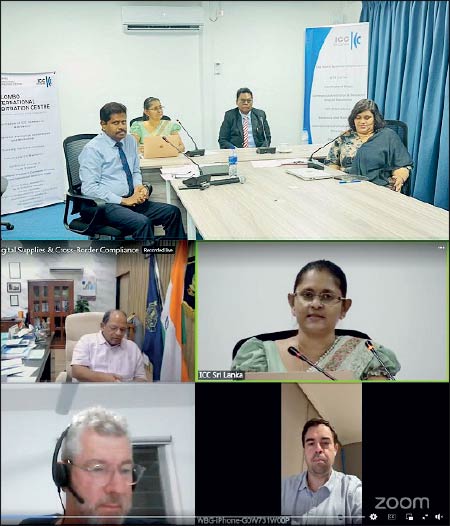Tuesday Feb 17, 2026
Tuesday Feb 17, 2026
Wednesday, 10 September 2025 05:26 - - {{hitsCtrl.values.hits}}
 The International Chamber of Commerce Sri Lanka (ICCSL), through its Research, Knowledge Management, and Taxation (RKMT) Committee, recently successfully hosted a hybrid webinar titled “VAT on Digital Services and Cross-Border Compliance,” attracting businesses, professionals, and policymakers eager to understand the newly implemented VAT framework for digital services.
The International Chamber of Commerce Sri Lanka (ICCSL), through its Research, Knowledge Management, and Taxation (RKMT) Committee, recently successfully hosted a hybrid webinar titled “VAT on Digital Services and Cross-Border Compliance,” attracting businesses, professionals, and policymakers eager to understand the newly implemented VAT framework for digital services.
The session opened with a welcome note by ICCSL Chairman Shanil Fernando who emphasised the importance of preparing Sri Lanka’s business community for the digital economy. He underscored that effective tax administration in the digital space will not only strengthen Government revenue but also enhance fairness and competitiveness. His remarks set a strong foundation for the discussions that followed.
The keynote by KPMG Sri Lanka Principal – Tax and Regulatory Rifka Ziyard outlined the scope and enforcement mechanisms of the new VAT on non-resident digital service providers, offering clarity on how global trends are shaping local reforms. She mentioned that $ 40 million is the anticipated revenue from VAT on Digital Services and shared her insights on reforms required to strengthen the VAT framework. Following this,
EY Partner/Principal Velauthapillai Shakthivel focused on the practical obligations for Sri Lankan businesses, particularly those receiving digital services. His insights into compliance strategies, registration requirements, and input tax credits helped businesses anticipate operational changes.
Adding an international perspective, World Bank South Asian Region Senior Economist Christian Lucas shared lessons from global implementation, highlighting both successes and pitfalls. His contribution underscored the importance of careful policy design and reinforced the value of learning from international experiences. Complementing this, Asian Development Bank (ADB) Consultant Gary Artuso presented fresh regional insights, drawing on ADB’s recent research and publications. His session provided valuable comparisons across South Asia, emphasising regional readiness and long-term strategies. One of the most anticipated segments came from Government of India Principal Commissioner Dheeraj Rastogi who shared the India’s GST experience on digital services and highlighted learnings that Sri Lanka can adopt. His presentation offered Sri Lanka a roadmap, showing how lessons from India’s reforms could pave the way for a smoother transition in Sri Lanka.
The panel discussion and Q&A session proved to be thought provoking. Participants posed practical and pressing questions, ranging from documenting procedures and guidelines to the treatment of cross-border transactions and transitional support. The high level of audience engagement demonstrated both the relevance of the topic and the eagerness of stakeholders to be well informed.
Moderated by RKMT Committee Chairperson Dr. Nadee Dissanayake, the webinar concluded with a summary that distilled the proceedings into three key takeaways for Sri Lanka:
Clarity in implementation: Businesses must be provided with clear guidelines and well-documented procedures to reduce uncertainty and support smooth compliance.
International learning: Sri Lanka should adapt lessons from global and regional experiences, such as India’s GST reforms and best practices shared by the World Bank and ADB, to avoid costly missteps.
Building confidence through transparency: Open communication, guidance for taxpayers, and transparent administration will be essential to build trust and ensure the long-term success of the new digital VAT system.
The event closed on a high note, with participants praising the ICCSL and the RKMT Committee for convening such a timely and knowledge-rich program. As Sri Lanka embarks on this digital VAT journey, the insights shared during the webinar will be vital in shaping effective policies. Special appreciation was also extended to Daily FT for its media support, which ensured wide outreach and greater impact. This landmark session highlighted the importance of global knowledge sharing in strengthening Sri Lanka’s readiness to manage digital taxation.